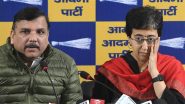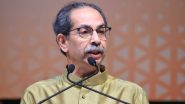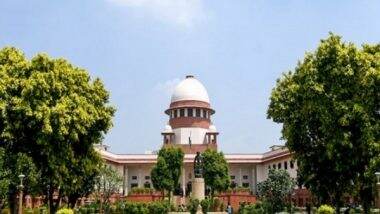New Delhi [India], December 12 (ANI): The Supreme Court on Thursday restrained all courts across the country from passing any effective interim or final order including orders of survey in pending suits against existing religious structures.
A bench of Chief Justice of India Sanjiv Khanna and Justices PV Sanjay Kumar and KV Viswanathan also ordered that no fresh suits can be registered over such claims while the court is hearing pleas challenging the Places of Worship (Special Provisions) Act, 1991.
"As the matter is sub-judice before this court, we deem it fit to direct that while suits may be filed, no suits would be registered and proceedings undertaken till further orders of this court. In the pending suits, courts would not pass any effective interim order or final orders, including orders of survey," the bench ordered.
The apex court was informed that at present 18 suits are pending in the country against 10 mosques or shrines.
The bench also granted four weeks to Centre to file an affidavit in a batch of petitions challenging certain provisions of the Places of Worship (Special Provision) Act, 1991, that prohibit the filing of a lawsuit to reclaim a place of worship or seek a change in its character from what prevailed on August 15, 1947.
The pleas challenged the Places of Worship Act saying that the Act takes away the rights of Hindus, Jains, Buddhists, and Sikhs to restore their 'places of worship and pilgrimages', destroyed by invaders.
Daughter of the Kashi Royal Family, Maharaja Kumari Krishna Priya; BJP leader Subramanian Swamy; Chintamani Malviya, former Member of Parliament; Anil Kabotra, a retired army officer; advocates Chandra Shekhar; Rudra Vikram Singh, resident of Varanasi; Swami Jeetendranand Saraswati, a religious leader; Devkinandan Thakur Ji, resident of Mathura and a religious guru and advocate Ashwini Upadhyay among others have filed the pleas in the apex court against the 1991 Act.
The 1991 provision is an Act to prohibit conversion of any place of worship and to provide for the maintenance of the religious character of any place of worship as it existed on August 15, 1947, and for matters connected therewith or incidental thereto.
Jamiat Ulama-i-Hind, India Muslim Personal Law Board, Committee of Management Anjuman Intezamia Masjid which manages the mosque in the Gyanvapi complex, Shahi Idgah mosque committee of Mathura, among others, also filed applications in the top court against the petitions challenging the validity of certain provisions of the 1991 law.
They challenged the petitions filed by some Hindu petitioners saying that entertaining the pleas against the Act will open floodgates of litigations against countless mosques across India.
Filing intervention application in the case they sought dismissal of pleas challenging the Places of Worship Act.
One of the pleas challenging the 1991 Act stated, "The Act excludes the birthplace of Lord Rama but includes the birthplace of Lord Krishna, though both are the incarnation of Lord Vishnu, the creator and equally worshipped all over the world."
The pleas further stated that the Act blatantly offends the right of Hindus, Jains, Buddhists, and Sikhs to restore, manage, maintain and administer the places of worship and pilgrimage guaranteed under Article 26 of the Indian Constitution.
The petitions filed have challenged the constitutional validity of Sections 2, 3, and 4 of the Places of Worship (Special Provisions) Act 1991, which it said violates the principles of secularism and the rule of law, which is an integral part of the Preamble and the basic structure of the Constitution.
The pleas said that the Act has taken away the right to approach the Court and thus right to judicial remedy has been closed.
Section 3 of the Act bars the conversion of places of worship. It states, "No person shall convert any place of worship of any religious denomination or any section thereof into a place of worship of a different section of the same religious denomination or of a different religious denomination or any section thereof."
Section 4 bars filing of any suit or initiating any other legal proceeding for a conversion of the religious character of any place of worship, as existing on August 15, 1947.
"The Places of Worship Act 1991 is void and unconstitutional for many reasons," the plea said, adding that it offends the right of Hindus, Jains, Buddhists, and Sikhs to pray, profess, practice and prorogate religion (Article 25), the petitions said.
"It also infringes on their right to manage, maintain and administer the places of worship and pilgrimage (Article 26)," Pleas added.
"The Act deprives these communities from owning/acquiring religious properties belonging to deity (misappropriated by other communities) And also takes away the right to take back their places of worship and pilgrimage and the property which belong to deity," stated the pleas.
It also mentioned that the Act further deprives Hindus, Jains, Buddhists, Sikhs to take back their places of worship and pilgrimage connected with cultural heritage (Article 29) and it also restricts them to restore the possession of places of worship and pilgrimage but allows Muslims to claim under Section 107, Waqf Act.
"It is respectfully submitted that the Central Government by making impugned provision (Places of Worship Act 1991) in the year of 1991 has created arbitrary irrational retrospective cutoff date, declared that character of places of worship and pilgrimage shall be maintained as it was on August 15, 1947 and no suit or proceeding shall lie in the court in respect of the dispute against encroachment done by barbaric fundamentalist invaders and such proceeding shall stand abated," the PILs stated. (ANI)
(This is an unedited and auto-generated story from Syndicated News feed, LatestLY Staff may not have modified or edited the content body)













 Quickly
Quickly
















